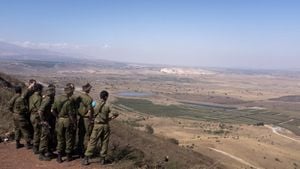Yemen has flared up on Israel’s radar, with recent missile attacks aimed directly at the heart of its military operations. Reports indicate the Yemeni Armed Forces’ successful strike on the Nevatim base, utilizing the Felestin-2 hypersonic ballistic missile. Brigadier General Yahya Saree, the spokesperson for Yemen’s military, affirmed the missile’s successful impact, showcasing Yemen’s technological advancements amid regional tensions.
Within the broader geopolitical chessboard, Yemen’s actions are part of its vocal support for Palestine, especially following the escalation of hostilities after October 7. During this time, Palestinian resistance launched what is termed Operation Al-Aqsa Storm, engaging the Israeli military, leading to severe retaliatory actions from Israel across Gaza.
The humanitarian toll has been staggering. According to various sources, including the United Nations, the consequences of the conflict have led to the deaths of over 27,948 individuals, with more than 67,459 reported injuries, predominantly affecting women and children. Yemen's military leaders have vowed not to cease their retaliations against the Israeli state until the assaults on Gaza are halted.
Israel’s military campaign has faced condemnation, with the leader of the Yemeni Houthi movement, Abdul-Malik al-Houthi, pointing to Israel's desperation reflected through its tactics of forced displacement and civilian casualties. Houthi criticized the lack of response from Arab and Muslim nations, portraying it as indicative of broader moral failings. "The Israeli enemy, failing in military confrontation and unable to achieve its declared goals, has resorted to a criminal approach of widespread targeting of civilians,” he stated. His words resonate deeply among many who view the situation as not only regional but fundamentally tied to widespread humanitarian concerns.
This situation evokes thoughts about the complex alliances formed across the Middle East and the impact they have on the ground. Yemen’s support for Palestine interconnects with the regional dynamics, where nations such as Iran and various groups regard the Israeli actions as aggression against Muslim solidarity.
The narrative is not only about missiles and tanks; it involves grassroots support, as indicated by mass rallies organized across Yemen. Thousands filled the streets, calling for unity and standing against what they view as injustices wrought by Israel. These demonstrations reflect the sentiment among the populace—an impassioned call for solidarity not just with Palestinians but with all resisting forces against oppression.
International reactions vary markedly. The United States, alongside Britain, established military coalitions aiming to fortify support for Israel. This has drawn criticism and pushback from various factions throughout the region, illustrating the fragmented responses to conflict across the globe.
Within this convoluted backdrop, Hezbollah has also escalated its role. The Lebanese group stands as unwavering support for Hamas and has intensified its operations against Israeli targets. Reports indicate recent strikes on naval locations, with the group capitalizing on perceived weaknesses within Israeli defenses due to the current military situation. The change in tactics and the choice to openly engage militarily represent an adaptive strategy facilitated by historical alliances and mutual objectives.
The humanitarian thread weaves through all actions taken. Criticism directed at Israel's aerial campaigns highlights the extensive loss of life, particularly among vulnerable demographics. This reality plays heavily on civilian psyches within Gaza, where the destruction of homes and lives continues unabated. Community leaders and humanitarian organizations have documented these atrocities, painting the conflict not just as military engagement but as a wide-scale violation of human rights.
Prayers and calls for cease-fire echo across the conflict-ridden regions, yet the reality seems to ebb and adapt based on military successes or failures. Leaders like al-Houthi call for comprehensive support from the Muslim community worldwide, urging action and solidarity as a means to insight change. The cyclical nature of violence and retaliation shows no immediate signs of abatement.
The affected territories show signs of resilience, though tempered by the scars of war. Soldiers and civilians alike express resolve, as reports from the ground reveal many joining the fight—whether through military, diplomatic, or humanitarian efforts. Young soldiers, newly drafted or volunteers, often demonstrate capabilities beyond expectation, engaging directly with local communities, establishing deep ties as they combat perceived threats against their homeland.
While international dialogues around the conflict persist, with varying opinions on interventions and support, at the heart lies the persistent struggle for dignity, autonomy, and survival. The dynamic continues to shift hourly, as each missile fired or cease-fire proposed influences the outlook for both Palestinians and Israelis.
Continuing to meta-analyze events with perspectives from impacting leaders across the Middle East shows how interconnected the fates have become. Yemen’s military advances tie back to sentiments voiced through organizations and movements, emphasizing the regional features of this conflict stretching far beyond borders.
Periodically surfacing, the question lingers: When would accountability be held for the actions executed under the guise of military necessity? The voices of the injured, aching for peace, will continue to rise amid the bombing and chaos as the outside world attempts to dissect this tangled web of conflict.
This narrative signifies the human costs of wars fought, echoing the urgent need for both sympathy and action from global leaders. Only through collaborative efforts and shared humanity can resolutions be sought to traverse what appears to be insurmountable despair.
While politicians argue and military factions confront, the innocent lives caught within all this continue to be the most significant casualties. They remain hushed amid the noise, desperately hoping for days filled with laughter rather than the sound of sirens warning of airstrikes.
Recent findings by humanitarian organizations present harrowing statistics: at least 70% of casualties reported from Gaza occur among women and children. Reflecting on these numbers invites grave concern and unity among global citizens, empowering collective pushes toward justice and solace.
Peace initiatives may grow from the ashes of destruction, but the initial seeds must be planted through acknowledgment and reparations. Making strides forward may demand reforms within not just governmental policies but also cultural shifts toward the acceptance and resilience of those affected. Only then can lasting peace bloom from the ravaged soil of conflict.



